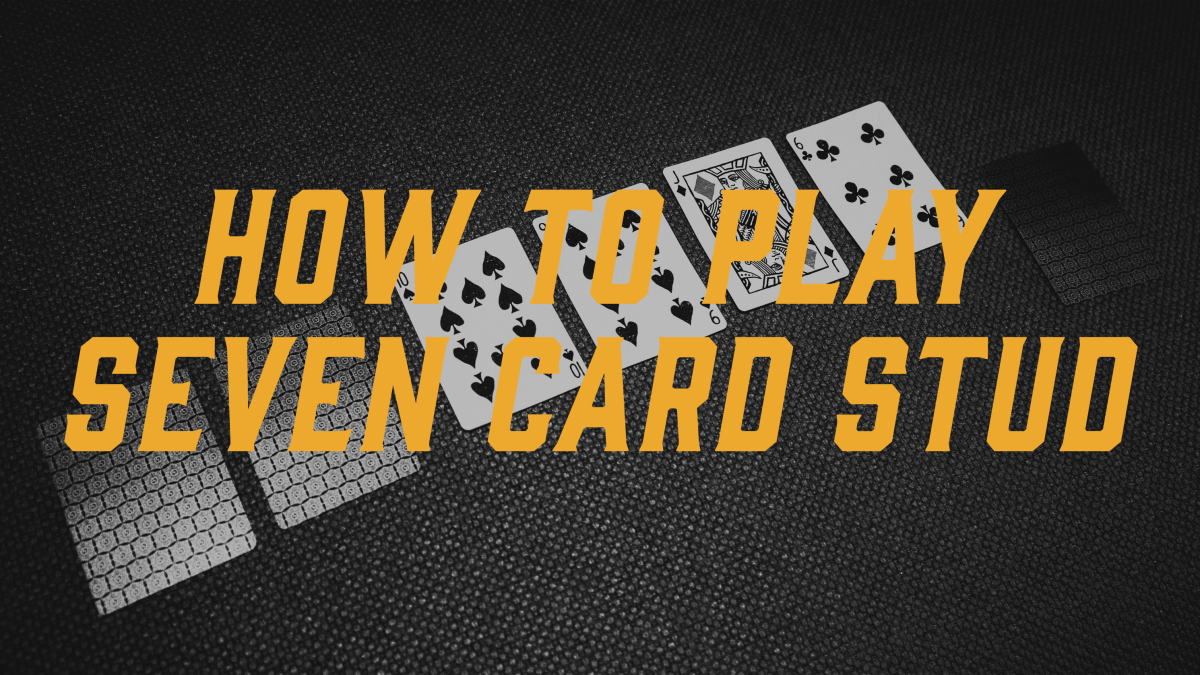The Art of Playing 7 Card Stud Poker: A Guide for Beginners

Allow your imagination to transport you into the Wild West, within a smoky saloon with only dim lighting. You can feel the intensity of cards shuffling and smell whiskey on your opponent's breath as they fix their gaze upon you, daringly awaiting for you to make an attempt.
This is 7 Card Stud Poker—a realm where anything is possible if one has enough bravery and strength.
Getting Started: The Basics of 7 Card Stud Poker
For the game to begin, each participant must put in an ante bet - a small stake required by all players. Following that, everyone is given two cards facing downwards and one card up for display. This marks the start of real entertainment!
To begin the betting process, the player with the lowest face-up card needs to place a small bet known as "the bring-in". After this initial wager has been placed, players may choose to call (matching prior bets), raise (amplifying previous stakes), or fold (discarding their hand and exiting play). Betting will then move in clockwise order around the table.
The Third Street: More Cards, More Bets
After the initial betting round, an additional card is dealt to each player face-up. This stage is referred to as third street. The gambler with the most desirable hand showing begins betting first; if two players have a similar high card, precedence goes to whoever sits nearest the dealer's left side.
Gamblers can call, raise, or fold as the betting process moves in a clockwise direction. If one person raises their bet, all other players must either match said bet or opt out of the game.
The Fourth and Fifth Streets: The Game Gets Tougher
After the third street, yet another card is dealt face up to all players. This fourth street marks when the real fun begins! The player with the highest-ranking hand takes the lead in betting and continues until it's time for fifth street.
Fifth street is here, and players are dealt their fifth card face up. At this point, you should have a good grasp of what kind of hand you possess. If your confidence runs high, why not go big and intimidate the rest? On the other hand, if uncertainty lingers, then fold to await for another round.
The Sixth and Seventh Streets: Showdown Time
After the fifth street, each competitor is dealt their sixth card face up. On the seventh and ultimate street, each contestant receives their concluding card facedown - a critical moment in which all players must create their best five-card hand possible to succeed. This is where the game truly spices up!
The player who is displaying the highest hand should lead off with their bet, and then betting continues in a clockwise direction around the table. If there are still multiple players remaining after all bets have been placed, it's time for the showdown! During this momentous occasion, each individual shows what cards they possess. Lastly, whoever holds onto that unbeatable five-card combination will be declared victorious and take home all of the chips from within the pot!
Tips and Tricks For 7 Card Stud Poker
1. Pay attention to the upcards:
Attention must be paid to the upcards that your opponents are displaying in 7 stud poker, as it will permit you to get a better understanding of what kind of hand they might have. This knowledge is crucial if you wish to make smart decisions and come out on top!
2. Know when to fold:
In 7 stud poker, it's essential to recognize when you should fold your cards. If you have a weak hand, don't hesitate to throw in the towel and cut your losses early on—it will save you money in the long run!
3. Play tight at the beginning:
If you're just beginning to play 7 stud poker, playing tightly is the way to go. This strategy involves holding only strong hands and discarding weaker ones - a great way to protect your chips while extending your presence at the table!
4. Mix up your play:
To be a successful poker player, mixing up your game is essential. Don't let your opponents become accustomed to one particular way of playing; surprise them with bluffs, slow plays, and aggressive moves from time-to-time. Establishing a tight playing style is key - but don’t forget the importance of variation!
5. Watch your opponents closely:
Paying close attention to your opponents' upcards is only one element of a successful poker strategy; observing their actions is equally important. Careful study may reveal signs, or "tells," which can give you insight into the strength of their hand.
6. Manage your bankroll:
Financial management is essential when playing 7 stud poker. Never wager more than you can bear to part with, and never attempt to compensate for losses by placing higher stakes than usual. Staying within your budget and concentrating on the game at hand are key aspects of staying in control when gambling.
7. Stay focused:
Ultimately, in order to succeed when playing 7 stud poker, it's essential to remain concentrated. Consciously avoid distractions and emotions that may cloud your judgment and instead keep a level head to take advantage of the opportunities presented while making wise decisions. By staying focused throughout the game, you maximize your chances of succeeding!
Conclusion
With the following tips and tricks, you can be an expert in 7-card Stud Poker! If you ever feel stuck, just take into consideration these wise words from a poker pro: "If you can't spot the sucker at the table within the first half hour, then you are the sucker."
So go forth, and may the odds be ever in your favor.







Leave a comment